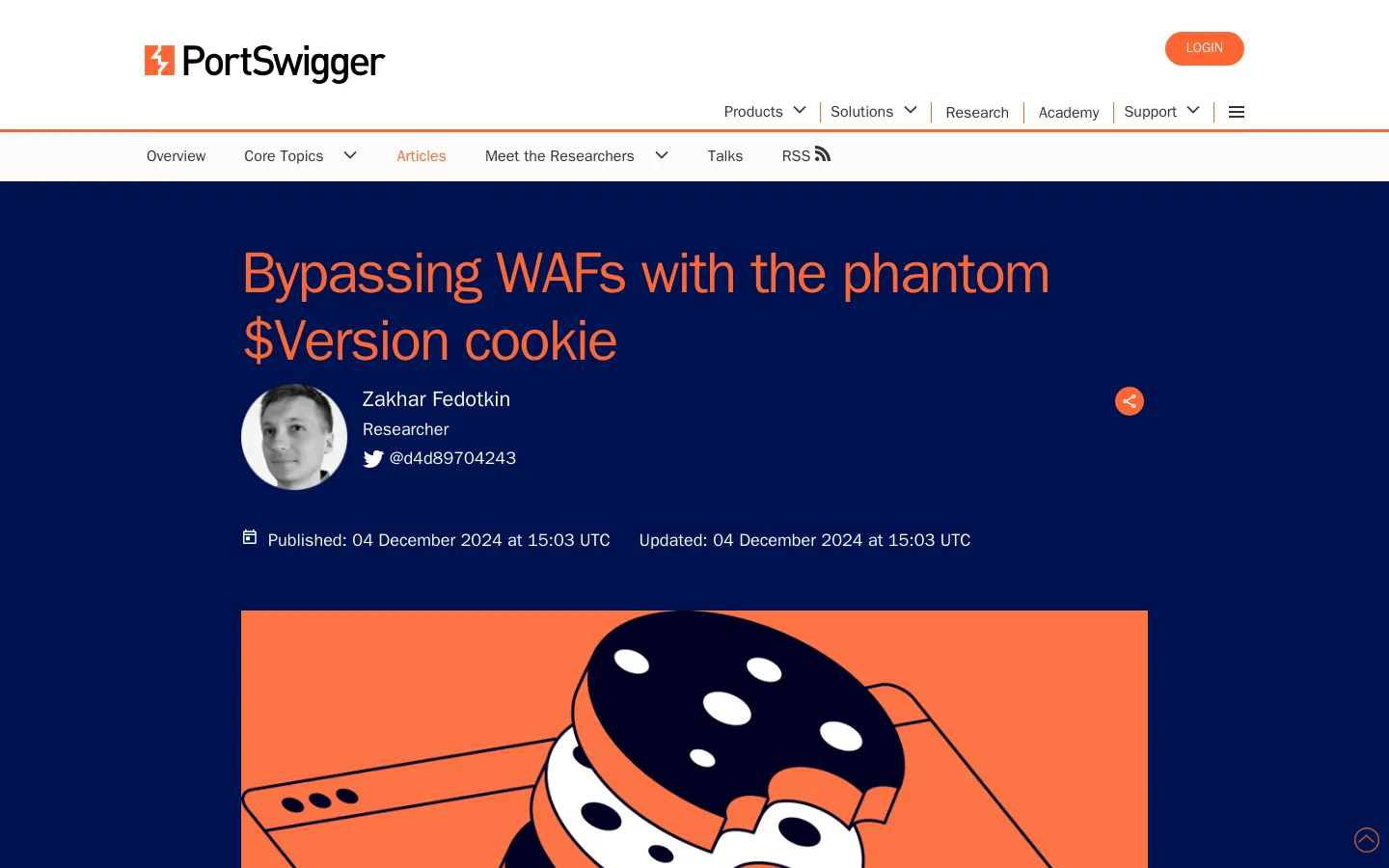
Phantom $Version Cookie and WAF Bypass Discussion
/ 4 min read
Quick take - The article discusses the significance of HTTP cookies in web functionality and user data management, while also highlighting their vulnerabilities due to parser discrepancies and providing best practices for developers to enhance security and compliance with established standards.
Fast Facts
-
Role of HTTP Cookies: HTTP cookies are essential for user authentication, session management, and personalizing web experiences, but they also pose security risks due to parser inconsistencies.
-
Historical Standards: The evolution of cookie standards began with RFC 2109, which established guidelines for cookie structure and usage, influencing browser and server interactions.
-
Key Cookie Attributes: Valid Cookie headers must include attributes like $Version, $Domain, and $Path, with special characters in values needing to be enclosed in double quotes to maintain validity.
-
Modern Frameworks: Tools like Spring Boot Starter Web and Python SimpleCookie enhance cookie management, providing developers with improved security measures to mitigate vulnerabilities.
-
Best Practices: Developers should disable legacy cookie support, rigorously validate user inputs, and understand cookie attributes to enhance security and prevent potential exploitation of vulnerabilities.
Understanding the Importance and Vulnerabilities of HTTP Cookies
HTTP cookies are a fundamental component of web browsing, playing a crucial role in managing website functionalities. They store user data and preferences, enabling seamless user experiences through features like authentication and session management. However, recent discussions have brought to light the vulnerabilities associated with these cookies, particularly due to inconsistencies in how different parsers handle them.
The Significance of HTTP Cookies
Cookies are indispensable for controlling various website features. They facilitate user authentication, manage sessions, and personalize user experiences. Despite their utility, cookies pose significant risks. Discrepancies among parsers can lead to vulnerabilities, potentially exposing sensitive user data to security threats. Understanding these vulnerabilities is essential for developers and users alike to ensure safe web interactions.
Historical Context of Cookie Standards
The evolution of HTTP cookie standards began with RFC 2109, which laid the groundwork for structuring and using cookies. This standard was pivotal in formalizing cookie management, influencing how browsers and servers interact with cookie data. Over time, these standards have evolved to address emerging security concerns and technological advancements.
Essential Attributes of Cookie Headers
For a Cookie header to be valid, it must include certain attributes:
- $Version: Indicates the version of the cookie standard being used.
- $Domain: Specifies the domain that can access the cookie.
- $Path: Denotes the URL path that must exist in the requested URL for the cookie to be sent.
Additionally, any special characters in Cookie values must be enclosed in double quotes to maintain validity, as outlined in RFC 2068.
Modern Frameworks and Cookie Handling
With advancements in web development, modern frameworks like Spring Boot Starter Web and Python SimpleCookie have emerged to streamline cookie management. These frameworks offer robust methods for handling cookie headers and legacy attributes. They ensure developers can implement cookies effectively while adhering to established standards. Their ability to manage cookie data with improved security measures helps mitigate some vulnerabilities associated with traditional cookie handling.
Implications for Developers and Users
As the web continues to evolve, understanding HTTP cookies becomes increasingly important. Developers must stay informed about historical standards and current best practices to safeguard user data. Users should also be aware of how cookies function on websites they visit. This knowledge empowers them to make informed choices regarding their online privacy and security.
Actionable Steps for Enhanced Security
-
Disable Legacy Support: Ensure that legacy support for RFC2109 is disabled on web servers unless explicitly required. This step is crucial in maintaining the integrity of cookie handling and avoiding potential vulnerabilities.
-
Rigorous Input Validation: Validate all user inputs rigorously to identify and mitigate potentially dangerous data. This practice enhances security and improves overall application robustness.
-
Avoid Assumptions: Do not rely on assumptions about specific characters in user inputs to reduce unexpected behavior risks. Treat all inputs as potentially harmful to create a more resilient system.
-
Understand Cookie Attributes: Familiarize yourself with cookie attributes like $Version, $Domain, and $Path. A clear understanding will help manage session data effectively and ensure compliance with security protocols.
By following these guidelines, developers can significantly improve the security and functionality of their web applications, providing a safer user experience.



